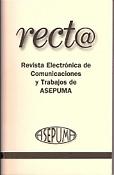The effect of IFRS adoption on the value relevance of accounting information: the case of Colombian bank
DOI:
https://doi.org/10.24310/recta.22.2.2021.19882Keywords:
Book value, Colombian banks, earnings, IFRS, Ohlson's model, value relevanceAbstract
The value relevance of accounting information can be measured through statistical relationships between the information contained in the financial statements and stock market values or returns. In this paper, we compare the value relevance of the accounting information of eight banks listed on the Colombian Stock Exchange (BVC, for its acronym in Spanish) before and after the adoption of the International Financial Reporting Standards (IFRS). For this purpose, we use three monthly time series (book value of equity per share—representing the statement of financial position—, earnings per share—representing the comprehensive income statement—, and stock price per share) from January 2001 to December 2018. In addition, we apply panel data models based on Ohlson's model. The results show that accounting information has been relevant before and after IFRS adoption, which means that the implementation of IFRS has not increased its value relevance.
Downloads
Publication Facts
Reviewer profiles N/A
Author statements
Indexed in
-
—
- Academic society
- N/A
- Publisher
- UMA Editorial. Universidad de Málaga
References
Agostino, M., Drago, D., & Silipo, D. B. (2011). The value relevance of IFRS in the European banking industry. Review of Quantitative Finance and Accounting, 36(3), 437–457. https://doi.org/10.1007/S11156-0100184-1/TABLES/6
Ahmed, K., Chalmers, K., & Khlif, H. (2013). A Meta-analysis of IFRS Adoption Effects. The International Journal of Accounting, 48(2), 173–217. https://doi.org/10.1016/J.INTACC.2013.04.002
Al-Hares, O. M., AbuGhazaleh, N. M., & Haddad, A. E. (2012). Value relevance of earnings, book value and dividends in an emerging capital market: Kuwait evidence. Global Finance Journal, 23(3), 221–234. https://doi.org/10.1016/J.GFJ.2012.10.006
Beisland, L. A., & Knivsfla, K. H. (2015). Have IFRS changed how stock prices are associated with earnings and book values? Evidence from Norway. Review of Accounting and Finance, 14(1), 41–63. https://doi.org/10.1108/RAF-06-2013-0079/FULL/XML
Bepari, M. K. (2015). Relative and incremental value relevance of book value and earnings during the global financial crisis. International Journal of Commerce and Management, 25(4), 531–556. https://doi.org/10.1108/IJCOMA-11-2012-0072/FULL/XML
Burgstahler, D. C., Hail, L., & Leuz, C. (2006). The Importance of Reporting Incentives: Earnings Management in European Private and Public Firms. The Accounting Review, 81(5), 983–1016. https://doi.org/10.2308/ACCR.2006.81.5.983
Chen, C. J. P., Chen, S., & Su, X. (2001). Is accounting information value-relevant in the emerging Chinese stock market? Journal of International Accounting, Auditing and Taxation, 10(1), 1–22. https://doi.org/10.1016/S1061-9518(01)00033-7
Clarkson, P., Hanna, J. D., Richardson, G. D., & Thompson, R. (2011). The impact of IFRS adoption on the value relevance of book value and earnings. Journal of Contemporary Accounting & Economics, 7(1), 1–17. https://doi.org/10.1016/J.JCAE.2011.03.001
Croissant, Y., & Millo, G. (2008). Panel Data Econometrics in R : The plm Package. Journal of Statistical Software, 27(2), 1–43. https://doi.org/10.18637/JSS.V027.I02
Der, B. A., Masri, M. H., & Abubakari, M. S. (2018). A comparative study of the value relevance of accounting information between financial and non-financial companies listed on the Ghana stock exchange. AfroAsian Journal of Finance and Accounting, 8(3), 271–295. https://doi.org/10.1504/AAJFA.2018.093466
Devalle, A. (2012). Value relevance of accounting data and financial crisis in Europe: an empirical analysis.
International Journal of Accounting and Financial Reporting, 2(2), 1–17. https://doi.org/10.5296/ijafr.v2i2.2527
Feltham, G. A., & Ohlson, J. A. (1995). Valuation and Clean Surplus Accounting for Operating and Financial Activities. Contemporary Accounting Research, 11(2), 689–731. https://doi.org/10.1111/J.19113846.1995.TB00462.X
Halim Kadri, M., Abdul Aziz, R., & Kamil Ibrahim, M. (2009). Value Relevance of Book Value and Earnings: Evidence from Two Different Financial Reporting Regimes. Journal of Financial Reporting and Accounting, 7(1), 1–16. https://doi.org/10.1108/19852510980000638
International Accouting Standard Board. (2018). IFRS - Actualización del IASB de diciembre 2018. https://www.ifrs.org/news-and events/updates/iasb/2018/actualizacion-del-iasb-de-diciembre-2018/
Jermakowicz, E. K., Prather-Kinsey, J., & Wulf, I. (2007). The Value Relevance of Accounting Income Reported by DAX-30 German Companies. Journal of International Financial Management & Accounting, 18(3), 151–191. https://doi.org/10.1111/J.1467-646X.2007.01011.X
Ji, H. (2017). A Service of zbw Leibniz-Informationszentrum Wirtschaft Leibniz Information Centre for Economics. People & Global Business Association (P&GBA), Seoul, 22(2), 90–97. https://doi.org/10.17549/gbfr.2017.22.2.90
Kwon, G. J. (2018). Changes in the value relevance of accounting information before and after the adoption of K-IFRS: Evidence from Korea. Afro-Asian Journal of Finance and Accounting, 8(1), 65–84. https://doi.org/10.1504/AAJFA.2018.089209
Mattesssih, R. (2002). Teoría del excedente limpio y su evolución: revisión y perspectivas recientes. Uniersidad de Ciencias Empresariales y Sociales, 9–48. http://dspace.uces.edu.ar:8180/jspui/handle/123456789/466
Odoemelam, N., Okafor, R. G., & Ofoegbu, N. G. (2019). Effect of international financial reporting standard (IFRS) adoption on earnings value relevance of quoted Nigerian firms. Http://Www.Editorialmanager.Com/Cogentbusiness, 6(1), 1643520. https://doi.org/10.1080/23311975.2019.1643520
Ohlson, J. A. (1995). Earnings, Book Values, and Dividends in Equity Valuation*. Contemporary Accounting Research, 11(2), 661–687. https://doi.org/10.1111/J.1911-3846.1995.TB00461.X
Papadatos, K., & Bellas, A. (2011). The Value Relevance of Accounting Information Under Greek and International Financial Reporting Standards: The Influence of Firm-Specific Characteristics. International Business Review, 76, 6. https://doi.org/10.1016/J.IBUSREV.2006.05.009
Păşcan, I.-D. (2015). Measuring the Effects of IFRS Adoption on Accounting Quality: A Review. Procedia Economics and Finance, 32, 580–587. https://doi.org/10.1016/S2212-5671(15)01435-5
Qu, X., & Zhang, G. (2015). Value-relevance of Earnings and Book Value Over the Institutional Transition in China: The Suitability of Fair Value Accounting in This Emerging Market. The International Journal of Accounting, 50(2), 195–223. https://doi.org/10.1016/J.INTACC.2013.01.009
Sousa Fernández, F. (2008). El declive del estado de resultados tradicional ante la irrupción actual del excedente limpio Perspectiva histórica y conceptual. http://scielo.org.mx/pdf/cya/n230/n230a4.pdf
Tama-Sweet, I., & Zhang, L. (2015). The Value Relevance of Fair Value Financial Assets During and After the 2008 Financial Crisis: Evidence from the Banking Industry. 3(1), 11–24. https://doi.org/10.15640/jfbm.v3n1a2
Tsalavoutas, I., André, P., & Evans, L. (2012). The transition to IFRS and the value relevance of financial statements in Greece. The British Accounting Review, 44(4), 262–277. https://doi.org/10.1016/J.BAR.2012.09.004
Downloads
Published
How to Cite
Issue
Section
License

This work is licensed under a Creative Commons Attribution-NonCommercial 4.0 International License.









